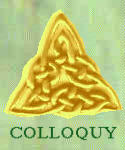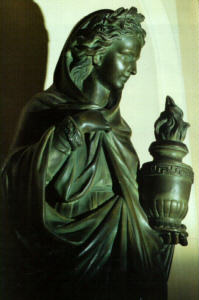

JCC: I love science-fiction too... a favorite author in the genre was the late Alice Sheldon, a.k.a. James Tiptree Jr., whose sardonic style and twists always reached me in the deep places of the psyche. Right now I'm reading Unquenchable Fire by Rachel Pollack ... came across a copy of this Arthur C. Clarke Award-winner for just $3 at Bookman's on the last trip to Tucson. It's delightfully strange! {smile} Oh, and I must not neglect an author who probably has provided the finest of delights: Chelsea Quinn Yarbro. Just recently secured used copies of Hotel Transylvania and The Saint-Germain Chronicles. Those were incredible; such a penchant for historical detail!
I enjoy Jack Nicholson's films too! Anthony Hopkins is my absolute fave, though! From Hannibal Lechter to Nixon to the butler figure, Enchanted April, was it? ... such diversity of portrayals ... or maybe not, on second thought? {laugh} Lately I have been reviewing my list of classical music favorites, pondering the common thread. Surely it's the large number of pieces written in D-minor. I read somewhere that this scale is rather close to what the ancients knew as the Aeolian mode.
KB: Has anyone read any of Pynchon's works? JP: No, I haven't read any of his works, but have considered it. Do you recommend them, and if so, what is his best?
JCC: I've not encountered them, but would enjoy hearing more. My long-time favorites have been the series featuring Saint-Germain and Olivia Clemens, by Chelsea Quinn Yarbro. Uniquely, these fit almost equally in the genres of Horror, Historical Fiction, and Romance, and the author's attention to detail is wonderful to behold. Right now I'm reading through The Palace, a fortunate acquisition from our favorite used book store.
WRW: As for Pynchon. I read Vineland. I have read some of Gravity's Rainbow. I have considered his most recent, Mason and Dixon. I recommend the novel The Goldberg Variations by Richard Powers. It came out in the early nineties amid strongly favorable reviews. It is historical, scientific, literary and amusing.
KB: I am currently reading Crying of Lot 49. IMO Pynchon writes in the tradition of Hugo (pardon the blasphemy). Lots of tangents that are extremely in depth and deliciously thought provoking. All commentaries I have read recommend Crying... as the best introduction to Pynchon.
CW: {Pynchon} ... is one author that I've found it almost impossible to sit still long enough to read. Gravity's Rainbow is a masterpiece however, in my opinion. My personal faves right now: P.K. Dick - just read The Three Stigmata of Palmer Eldrich (in one evening - unusual for me, I couldn't put it down), Borges, Burroughs, J.G. Ballard (War Fever is great).
Re: Chelsea Quinn Yarbro ... Have you seen her "Michael" series? Suggested reading: Ultimate Journey by Robert Monroe (Far Journeys is also relevant) and then Messages from Michael by C.Q. Yarbro. I'd be interested in anyone's comments about these books. They are very provocative reading if read in combination.
JCC: Something over ten years ago, a dear friend (University prof. of English Literature, who did her Ph.D. dissertation of Emily Dickinson) introduced me to the Michael series. I was indeed impressed by them at the time... a grand coherent system delineating the essence of the human soul and its intertwining in the meaning of history.
Borrowing a slogan from the X-Files, "I want(ed) to believe". This seemed to me to be the first piece of so-called "channeled material" that was not utterly puerile (including a lot of scripture). No offense, just my opinion ... self-contradiction, prejudice, vehemence, hatemongering, pettiness in Divine Writ... these things, let us say, have posed serious challenges to my ability to believe unconditionally.
Well, Muhammad extols the Qur'an, challenging the doubters: "produce ye then a single verse like unto it!" Seems to me to be a thing accomplished countless times in the great poetry and contemplative writings of many sources, and I'll add "Michael" to that list.
...A grand system, owing a little to Gurdjieff and Ouspensky perhaps, but I'd give not a little credit to Yarbro herself for brilliance and imagination... in the fine details one can see the hallmarks and tiny cherished flaws of human inventiveness. Is it not so?
CW: Check out Monroe's last two books Far Journeys and Ultimate Journey. If you can only read one check out the latter. Reading both you can see the progression of understanding. Also, Monroe provides techniques that one could utilize for one's own personal research.
KB: Hello from an infrequent moment of lucidity! I thought it necessary to recommend Mason and Dixon by Thomas Pynchon. Thus far... excellent!
JCC: The Witching Hour is possibly Anne Rice's finest. It covers thirteen generations of the Mayfair witches with a remarkable intimacy, detail, and color. One comes to love the characters. Her Cry to Heaven I read in the summer of '92, and still remains a vivid, powerful experience. Picking up the thread of conversation again after a hiatus, I spent the July 4 holiday weekend reading Hannibal, the long-awaited Thomas Harris sequel to Silence of the Lambs. Talk about food for thought! It was a thoroughly gripping panorama of the evil genius, or at least what in reality characterizes evil for most of us. Near the end is a vignette of the childhood trauma which shaped the future of Dr Hannibal Lechter. Ooh, I see a record-grossing film on the horizon, in double-entendre! Would it not be a challenge to compose the score for that one? Actually I would turn the discussion now to music ...
TC: Perhaps my musical neurons are biased by what I have heard, but I find that Bernstein's 1960's recordings of Shostakovich 5 and Gershwin's "An American in Paris" to be unequalled by subsequent recordings of the same, including Bernstein's. Their exuberance and energy are abundant and lift me forcefully to higher place.
I just heard a London Symphony recording of the above Gershwin piece and I found it stiff and unsatisfying. It reminded me of Steve Reich's quip about the incongruity of von Karajan conducting Copeland.
I have heard so many versions of the Shostakovich 5th, but it the first recording that I heard, cited above, that moves me the most. In terms of the fourth movement, all of the Russian versions that I have heard are conducted at what seems to be half-speed but apparently at the tempo that the composer intended. They seem ponderously pesante, though.
JCC: I'm usually not so discriminating over any particular recording of a piece of music that I've come to love ... but it's true that there are amazing differences even from the same performer or conductor over the years. Perhaps it's sheer luck, again, as with WallStreet.com, that everything comes together so perfectly just one time and might not be done again at the same level. I'll always be grateful to Bernstein for popularizing Mahler's works, which had become neglected even in Vienna. It's the Symphony No. 6 in which I find such breathtaking contrasts, a bit more than I can handle sometimes.
EM: Hello Julia and group, from age 5 to age 55 I spent more time on music than any other activity. I played, or had lessons on: saxophone, clarinet, piano, oboe, recorder, and organ. Sometimes people would ask me, which instrument did I like best? I loved them all, for different reasons. Sometimes I would be asked, what or whose music did I like best? Truest answer here: whatever I played or listened to last, most of the time.
My musical memory is slipping, in my 20's I could hear the entirety of Beethoven's 9th in my head any time I want. Now, just sections of it. I can't tell you the number of boring meetings that I spent enjoying great music, all the while appearing pleasantly pleased at whatever tedium was being transacted.
TC: Walking through the subway at 7 AM, I heard this 70 year old playing clarinet who, after reminding me that it was the 100th anniversary of Duke Ellington's birth (April 29 ?), encouraged, no, exhorted me to pick mine up again.
My embouchure will never be what it once was -- I used to play with a Borbeck 13 mouthpiece with size 5 reeds -- but my love of music remains. I can no longer play through Weber and Mozart concertos competently and with a great tone, but I can play Ellington ballads from a jazz fake book with some degree of feeling and cogency, and it's fun. I am self-taught on piano, i.e., I am not very good, but I am trying to harmonize Ellington's "Prelude to a Kiss". For most of the piece I am using so-called Upper Structures on the dominant 7th chords. Now I am reminded that I can use upper structures on major seventh chords. Thanks for making me think about this.
Everyone I have asked says replies that Beethoven's 9th is his best. I guess that I have to listen to it some more, several times more, before I'll ever believe that it beats the 3rd. Is the Eroica piano concerto the one that is in Eb? If it is, I like it for the same reason that I like the 3rd symphony, namely, it's exuberant and joyous. The 3rd rushes out of the starting gate -- BAM! BAM! Then syncopative seduction ensues and you're off. The 3rd seems to look wild-eyed toward the future; the 9th seems to reflect on the past while at the same time anticipating the future.
I wanted to get some new music, but I did not know what, and now, per the group, I will choose 6-Mahler and "Eroica" piano concerto. What version of Mahler's 6th do you have ?
JCC: George Szell conducting the Cleveland Orchestra, originally recorded October, 1967, on a Sony Essential Classics CD, SBK 47654. It's one of my treasures found on a foray to Bookman's in Mesa, a favored source for used CDs and books in several Arizona cities.
TC: Cleveland, supposedly one of the smaller orchestras, had a huge, tight sound under Szell. Cleveland with Szell, Ormandy with Philadelphia, Solti with Chicago (and London), Bernstein with NY (and Vienna for the Mahler series, I have been told) -- all of these were great collaborations. My favorite "new" conductor is Barenboim with Chicago.
I live in San Francisco and I have been very disappointed in the quality of our symphony orchestra (though I must say, in case he is "listening", that my clarinet teacher from years ago is with SF and he is great). We have a new, flashy conductor, Michael Tilson Thomas, a Bernstein protege, though I am not sure to what what degree he can improve things. He chooses interresting music, though.
What really is glaring is that there is a paucity of women conductors with world class orchestras, and I wonder why this is the case. I have met a few astounding, female student conductors whom I was I sure that I would hear about one day. That day has not arrived.
I am not suggesting that there is a difference between male and female conductors, nor am I suggesting that there is not a difference; I just don't know. Can anyone suggest a woman conductor for me to hear?
EM: My hearing is impaired now, and I do not always understand speech, but I can hear music the same as always. I do not play or dance any more, but I get mad passions for particular videos or music, and listen to the same works through an incredible number of repetitions. In the last 5 years I haved watched "Swan Lake", Bolshoi Ballet, 1957, a hundred times or more, some sections many more than that. Same for "Riverdance". Same for the "Eroica" piano concerto, and most recently, "Ave Maria" with Lisa Otto and the Berlin Philharmonic.
